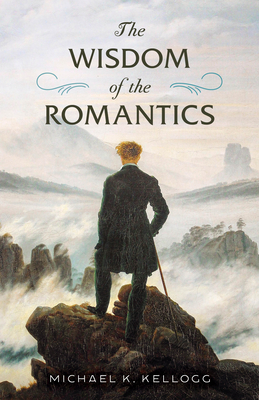The Wisdom of the Romantics

The Wisdom of the Romantics
Explore the transformative power of Romanticism--where emotion, imagination, and contradiction collide--through the eyes of its greatest thinkers and artists.
The post-Enlightenment movement known as Romanticism is a messy period; so messy, in fact, that many scholars eschew any attempt to define it. In reaction to the overreliance placed on reason by Enlightenment thinkers, Romantics emphasized individual freedom, emotional intensity, introspection, sincerity, and heightened imagination. They sought out nature at its wildest and most sublime: tall mountains, steep gorges, and resounding cataracts. They dabbled in the gothic and grotesque, in mythology, the sacred, and the mystical. Romanticism was a turning inward into subjectivity.
In The Wisdom of Romanticism, author Michael Kellogg profiles such disparate authors as Rousseau and Balzac, Goethe and Hegel, Wordsworth and Jane Austen, revealing that classifying Romantic thinkers is a highly subjective enterprise - which is the whole point.
That isn't to say that the change in thinking was inconsequential. Far from it. The transition from Haydn and Mozart to Beethoven and Chopin could not have been more dramatic. The German-born composer Giacomo Meyerbeer brought grand opera to new heights. The paintings of Francisco Goya, William Blake, Caspar David Friedrich, and J. M. W. Turner were all part of the transition away from a classical, academic style to the "emotive extremes" that heralded the coming of impressionism in the latter part of the century. In this latest entry into his popular Wisdom series, Kellogg explores the mercurial and ephemeral movement known as "Romanticism," arguing that what Romanticism "is" includes many contradictions, precisely what the rationalists rejected.
PRP: 323.46 Lei
Acesta este Prețul Recomandat de Producător. Prețul de vânzare al produsului este afișat mai jos.
291.11Lei
291.11Lei
323.46 LeiLivrare in 2-4 saptamani
Descrierea produsului
Explore the transformative power of Romanticism--where emotion, imagination, and contradiction collide--through the eyes of its greatest thinkers and artists.
The post-Enlightenment movement known as Romanticism is a messy period; so messy, in fact, that many scholars eschew any attempt to define it. In reaction to the overreliance placed on reason by Enlightenment thinkers, Romantics emphasized individual freedom, emotional intensity, introspection, sincerity, and heightened imagination. They sought out nature at its wildest and most sublime: tall mountains, steep gorges, and resounding cataracts. They dabbled in the gothic and grotesque, in mythology, the sacred, and the mystical. Romanticism was a turning inward into subjectivity.
In The Wisdom of Romanticism, author Michael Kellogg profiles such disparate authors as Rousseau and Balzac, Goethe and Hegel, Wordsworth and Jane Austen, revealing that classifying Romantic thinkers is a highly subjective enterprise - which is the whole point.
That isn't to say that the change in thinking was inconsequential. Far from it. The transition from Haydn and Mozart to Beethoven and Chopin could not have been more dramatic. The German-born composer Giacomo Meyerbeer brought grand opera to new heights. The paintings of Francisco Goya, William Blake, Caspar David Friedrich, and J. M. W. Turner were all part of the transition away from a classical, academic style to the "emotive extremes" that heralded the coming of impressionism in the latter part of the century. In this latest entry into his popular Wisdom series, Kellogg explores the mercurial and ephemeral movement known as "Romanticism," arguing that what Romanticism "is" includes many contradictions, precisely what the rationalists rejected.
Detaliile produsului










